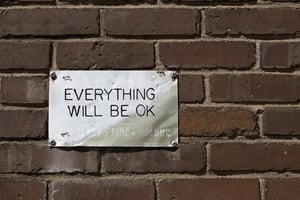How do you get your sustainability story out there?
There’s nothing more meaningless than an insincere apology.
And we have seen plenty of them already this year.
So, when Wilko found itself in the media spotlight this week because of “reckless” covid guidance, it was good to see it produce a response that ticked a lot of the ‘good apology’ boxes.
Let’s begin by looking at why the retail chain found itself in crisis media management mode.
The story centres on a leaked staff memo.
The Mirror revealed on Monday that Wilko shop and warehouse employees had been told they should attend work if they test positive for covid and have no symptoms.
Those who felt too unwell to work were told to follow the “absence policy” where the rules say if a worker is ill more than once in a year, they won't be paid for it beyond the statutory minimum.
GMB, the union representing the shop’s employees, described the covid guidance as “reckless”, while the parent of an employee posted on social media that “this lax attitude to health is deeply troubling.”
Wilko initially defended the policy. In a statement, it said: “We’re a family business that’s looked after our team for over 90 years through good times and bad. We operate an enhanced company sick pay policy, and support those team members most in need.
"We’ve updated our coronavirus advice to team members in line with government guidelines and will continue to serve customers to our best ability and look after team members who need our help."
But that stance didn’t stand for long. The company, which has more than 400 UK stores, U-turned on its policy the next day and issued a new response to the story on social media.
CEO Jerome Saint-Marc said: “When we get something wrong, we hold our hands up, admit it, and work to correct the situation.
“Today’s news has highlighted some miscommunication within our Covid-19 policies, and I wanted to reassure all our customers and team members that...”
He added he wanted to “reassure” customers and staff that the company's advice to staff with Covid symptoms, or those who test positive, was to stay at home and avoid contact with others.
Mr Saint-Marc finished by saying: “As throughout our 92 years on the High Street, the safety and wellbeing of our shoppers and teams is at the heart of our business and we're truly sorry for any understandable concerns our communications may have raised.”
To all our customers and team members: a statement from our CEO Jerome Saint-Marc, on our COVID19 policies. pic.twitter.com/pakEcFiMrf
— wilko (@LoveWilko) March 15, 2022
I love the opening line of that apology. Here we have a company admitting it has got something wrong and taking responsibility.
It could have gone further and added a ‘sorry’ to that opening line. But it sounds genuine and uses the sort of language employees and customers would use.”
A strong start, and I liked that it went on to explain the policy had changed – providing reassurance for those who work and shop in its stores, particularly those who may be more vulnerable.
It was also crucial the statement came from the top, showing visible leadership. This is always vital when your reputation is on the line. And it is something I’m sure will be explored further in our upcoming series of crisis communication masterclasses for The Media Team Academy.
All too often, organisations opt instead for anonymous statements which don’t have the same impact.
But Wilko’s response wasn’t perfect. Blaming the story on “miscommunication” sounds like an excuse, particularly when the company had initially defended the policy.
And the “any” and “may” clauses in the last line jar. Having said ‘we got it wrong’, why finish by saying “we’re truly sorry for any understandable concerns our communications may have raised”?
It detracts from the apology and creates the idea Wilko isn’t convinced it has done anything wrong. On our crisis communication training courses, we tell delegates to avoid words like ‘any’, ‘may’ and ‘if’ which damage the believability of apologies.
Despite the good parts of the response, Wilko has found itself looking at lots of headlines featuring damaging words like ‘U-turn’ and ‘backtrack’.
The question is, would it have faced headlines like this if its comms team had a seat at the top table?
Of course, we don’t know for sure. But I like a bet, and my money would be on the comms team not being in the room when the initial covid policy was discussed.
Had they been, you imagine they would have anticipated and highlighted that such a policy would result in a reputation hit.
We discuss the importance of comms being represented on senior leadership teams during our crisis communication training and Sean Ryan will, I’m sure, highlight its importance during the crisis communication masterclasses on The Media Team Academy.
It is also something I explored a few months ago in a blog with Michelle Nichols from Purple Pitch Communications. During our chat, she said the following, which resonated with me and I think is worth repeating:
“One of the biggest things a comms function does is that it provides a conscience to the organisation. Often you are the one who sits there and asks ‘how will that decision play out with the public?’, and ‘how might it make them feel about your brand?’.
“You are the conscience. Not in a fluffy way, but because you are there to help protect the reputation.
“Without that, organisations don’t have that foresight because the other people around the table tend to be operationally or profit focussed.
“It is the comms teams that think about perception, the impact of decisions and, once those decisions have been made, how they land in the best possible way.”
The final vital lesson from this story is that while covid has slipped down the media agenda a little as the Ukraine conflict has intensified, it is not that far from the top.
And organisations need to be aware that internal policies taking into account the removal of restrictions – including the legal requirement to self-isolate - can result in damaging media coverage.
Media First are media and communications training specialists with over 35 years of experience. We have a team of trainers, each with decades of experience working as journalists, presenters, communications coaches and media trainers.
Click here to find out more about our crisis communication training courses.
Subscribe here to be among the first to receive our blogs.




